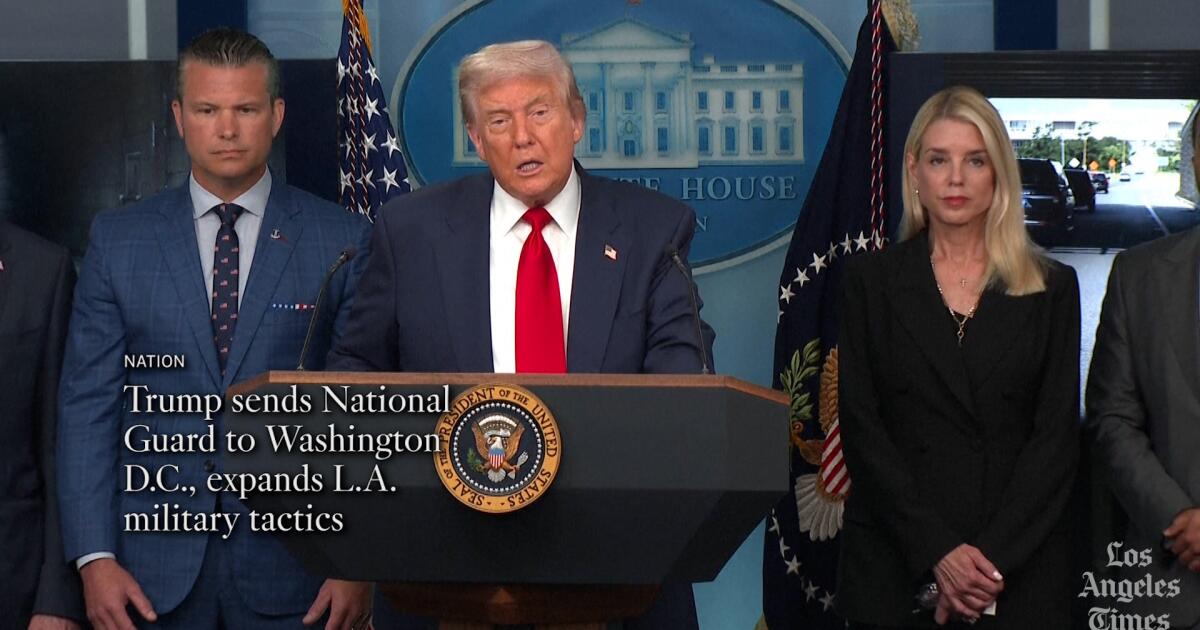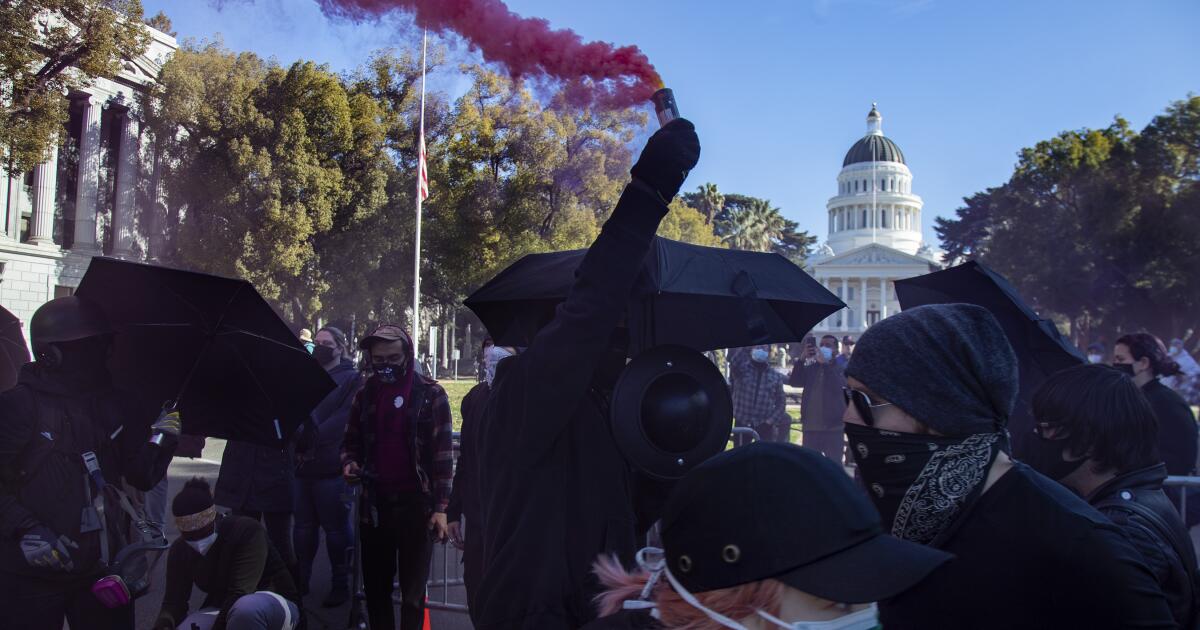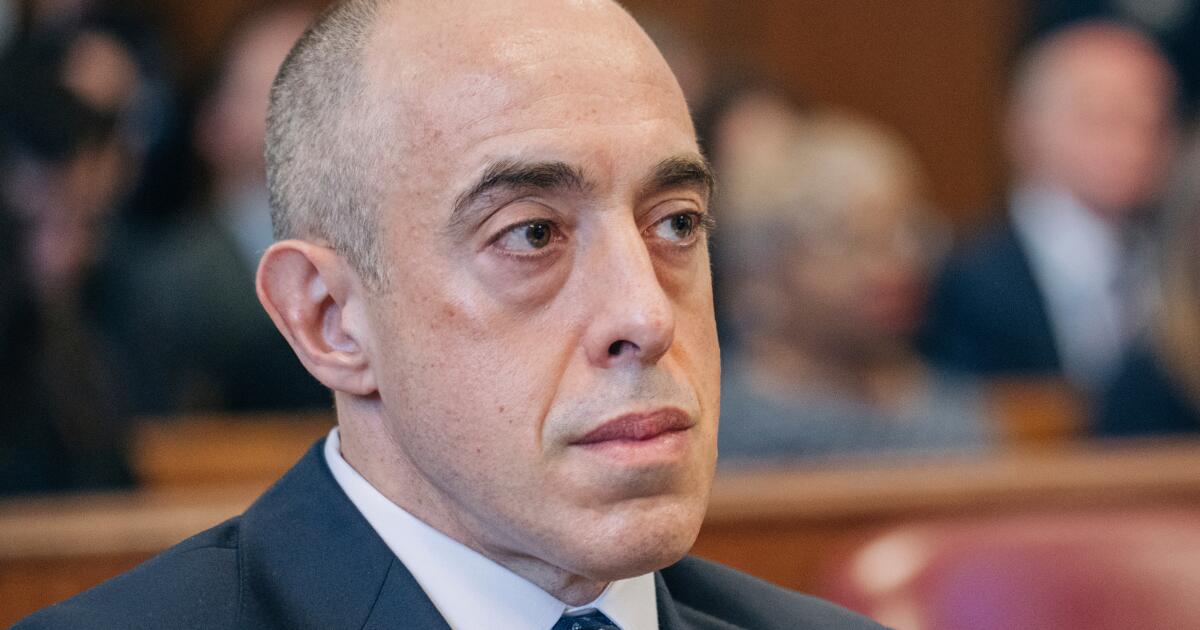
WASHINGTON — In an expansion of tactics started in June during immigration raids in Los Angeles, President Trump on Monday announced he would take federal control of Washington’s police department and activate 800 National Guard troops in the nation’s capital to help “reestablish law and order.”
“Our capital city has been overtaken by violent gangs and bloodthirsty criminals, roving mobs of wild youth, drugged-out maniacs and homeless people,” Trump said at the White House.
“This is liberation day in D.C.,” he declared.
Trump, who sent roughly 5,000 Marines and National Guard troops to L.A. in June in a move that was opposed by California Gov. Gavin Newsom and L.A. Mayor Karen Bass, issued an executive order declaring a public safety emergency in D.C. The order invoked Section 740 of the District of Columbia Home Rule Act that places the Metropolitan Police Department under direct federal control.
The California governor decried Trump’s move in D.C., warning that what happened in L.A. was now taking place across the country.
“He was just getting warmed up in Los Angeles,” Newsom said on X. “He will gaslight his way into militarizing any city he wants in America. This is what dictators do.”
In his briefing, Trump painted D.C. in dark, apocalyptic terms as a grimy hellhole “of crime, bloodshed, bedlam, squalor and worse.” He said he planned to get tough, citing his administration’s stringent enforcement on the nation’s southern border.
Already, Trump said, his administration has begun to remove homeless people from encampments across the city, and he said he planned to target undocumented immigrants, too. He vowed to “restore the city back to the gleaming capital that everybody wants it to be.”
As the White House noted in a fact sheet Monday, D.C. had a 2024 homicide rate of 27 per 100,000 residents, the nation’s fourth-highest homicide rate. By comparison, Los Angeles’ homicide rate is 7.1 per 100,000 residents.
But data also show violent crime has declined significantly in D.C. in recent years.
Just a few weeks before Trump took office, the Justice Department announced that violent crime in the city was at a 30-year low. Homicides were down 32%, robberies down 39% and armed carjackings down 53% when compared with 2023 levels, according to data collected by the Metropolitan Police Department.
In a press conference Monday, D.C. Mayor Muriel Bowser called Trump’s deployment of troops “unsettling and unprecedented.” But she also tried to strike a conciliatory tone with the president, acknowledging he was operating within the letter of the law in her district.
“We’re not a state. We don’t control the D.C. National Guard,” she told reporters. “… Limited home rule gives the federal government the ability to intrude on our autonomy in many ways.”
Bowser suggested the president was misinformed about crime in the district, advancing the idea that his views of D.C. were largely shaped by his COVID-era experience.
“It is true that those were more challenging times,” Bowser told reporters. “It is also true that we experienced a crime spike post-COVID. But we worked quickly to put laws in place and tactics that got violent offenders off our streets and gave our police officers more tools, which is why we have seen a huge decrease in crime.”
Accountability for gun-related crimes in the district remains an issue of concern, Bowser said, again offering an olive branch to Trump. But she noted that crime in the capital is down to pre-pandemic levels and that violent crime statistics are at 30-year lows.
Brian Schwalb, the elected attorney general of the District of Columbia, said in a statement that “there is no crime emergency” in D.C. and the administration’s deployment of troops was “unprecedented, unnecessary and unlawful.”
His office refuted the claims of Jeanine Pirro, U.S. attorney for the District of Columbia, who said juveniles, or as she put it, “young punks,” were too often granted probation or other lenient sentences
In D.C., the U.S. attorney’s office handles all adult felonies and the majority of adult misdemeanors, while Schwalb’s office exercises jurisdiction over crimes committed by juveniles and some adult misdemeanors.
Since Schwalb took office in January 2023, the office has prosecuted so many juveniles at higher rates that the mayor has had to issue an emergency order creating more space at juvenile detention facilities, according to his office. Last year, the office prosecuted over 90% of homicide and attempted homicide cases, 88% of violent assault cases and 87% of carjacking cases, according to the statement.
Ken Lang, a veteran of the Baltimore Police Department and an expert on law enforcement, said that Trump’s actions in D.C. could be an effort “to model a new national law enforcement strategy by having federal, state and local agencies better partner together.”
But because it is a federal district and not a state, he said, D.C. occupies a “unique legal position” under the Home Rule Act.
Oklahoma Mayor David Holt, who is also president of the United States Conference of Mayors, condemned Trump’s move as a “takeover,” and said “local control is always best.”
Holt noted that the Trump administration’s data — specifically, the FBI’s national crime rate report released last week — shows crime rates dropping in cities across the nation.
Trump said the deployment of troops in D.C. should serve as a warning to cities across the nation — including Los Angeles.
“Hopefully L.A.’s watching,” Trump said as he berated Bass and Newsom for their handling of the firestorm that swept through the region in January, destroying thousands of homes.
“The mayor’s incompetent and so is Gov. Newscum,” Trump said. “He’s got a good line of bull—, but that’s about it.”
Trump’s announcement that he was deploying troops to D.C. comes more than two months after he sparked a major legal battle with California when he sent thousands of troops to Los Angeles. He argued they were necessary to combat what he described as “violent, insurrectionist mobs” as protests broke out in the city against federal immigration raids.
But the protests calmed relatively quickly and local officials said they were primarily kept in check by police. The National Guard troops and Marines wound up sparsely deployed in Los Angeles, with some protecting federal buildings and some assisting federal agents as they conducted immigration enforcement operations. Military officials said the troops were restricted to security and crowd control and had no law enforcement authority.
Trump’s deployment of troops to D.C. immediately found its way into the pitched court battle in California over whether his administration violated the Posse Comitatus Act, which bars federalized military from civilian law enforcement.
As top U.S. military officials testified before Senior U.S. District Judge Charles R. Breyer in federal court in San Francisco on Monday, California lawyers quickly maneuvered to get Defense Secretary Pete Hegseth’s statement into evidence, hoping to bolster their argument that the government had not only knowingly violated the law, but was likely to do so again.
“That’s one of the tests for injunctive relief, right?” Breyer said. “Present conduct may be relevant on that issue.”
In June, Breyer ruled that Trump broke the law when he mobilized thousands of California National Guard members against the state’s wishes.
In a 36-page decision, Breyer wrote that Trump’s actions “were illegal — both exceeding the scope of his statutory authority and violating the 10th Amendment to the United States Constitution.”
But the U.S. 9th Circuit Court of Appeals paused that court order, allowing the troops to remain in Los Angeles while the case plays out in federal court. The appellate court found the president had broad, though not “unreviewable,” authority to deploy the military in American cities.
That decision is set to be reviewed by a larger “en banc” panel of the appellate court. Meanwhile, California continues to fight what it says are illegal uses of the military for civilian law enforcement in Judge Breyer’s court in San Francisco.



